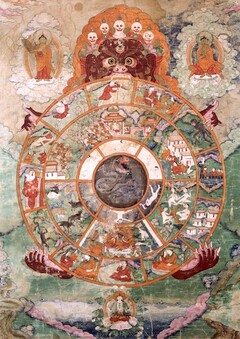Essence of the Dharmadhātu
Commentary on the Noble Essence of the Dharmadhātu
by Nāgārjuna
In the language of India: Ārya-dharmadhātu-garbha-vivaraṇa
In the language of Tibet: 'phags pa chos kyi dbyings kyi snying po'i rnam par 'grel pa
In the English language: Commentary on the Noble Essence of the Dharmadhātu
Homage to the Three Jewels!
It is said:
Those phenomena that originate from causes,
The Tathāgata has proclaimed these causes,
And also that which puts a stop to these causes,
This too has been taught by the Great Śramaṇa.
Here, "those phenomena" should be understood as sevenfold: 1) consciousness, 2) name and form, 3) the six sensory sources, 4) contact, 5) sensation, 6) birth, and 7) old age and death.
These phenomena are said to "originate from causes", since they arise due to five factors. What are these five causes? They are 1) ignorance, 2) craving, 3) clinging, 4) formations, and 5) becoming.
The cessation of these seven and their five causes is what is meant by "these causes and also that which puts a stop to these causes." This is also referred to as pacification, liberation and nirvāṇa.
Who has explained this? The Tathāgata has proclaimed this, which is to say that he has explained it. He is the Tathāgata (Thus-gone), since he has realized reality just as it is. He is also the Tathāgata since he unerringly teaches others how things are. One who teaches in such a manner is one who possesses such learning, one who reveals this path having realized it for himself. He is great, which means foremost, excellent, sublime and supreme. Great also describes someone who is wise, valiant, ascetic, enthusiastic, intensely diligent, and engaged in wondrous activity. In this case, since he knows all that is to be known, he is wise; since he has vanquished all afflictions, he is valiant; since he has perfectly cultivated ethical discipline, he is ascetic; since he does not tire of qualities and so on, he is enthusiastic; he has the intense diligence of one whose hair or head is aflame; and he has made manifest wondrous qualities and thus carries out wondrous activity. Such a one is great.
He is called a śramaṇa because he has pacified misdeeds and afflictions. He is a brahmin because he has abandoned all misdeeds; he is a śramaṇa because he has eliminated the fatigue (śrama; ngal ba) brought on by afflictions; and he is a renunciant since he has removed the impurities of selfhood. It is the Blessed One who has such qualities who taught this. The same applies for the truths of suffering, origination, cessation and the path.
Here, it is from the cause, ignorance, that formations and the rest, up to old age and death, arise without an agent. This is the progressive sequence. Knowledge that the causes, ignorance and the rest, have ceased is known as the sequence of reversal. Countering ignorance prevents the formations and the rest from arising. It is the Great Śramaṇa who teaches this.
Thus concludes the Commentary on the Noble Essence of Dharmadhātu composed by Ācārya Nāgārjuna.
Translated and edited by the Indian preceptor Jñānagarbha and the great editor Venerable Paltsek.
| Translated by Adam Pearcey, 2021.
Bibliography
Tibetan Editions
'phags pa chos kyi dbyings kyi snying po'i rnam par 'grel pa. Toh 4101, Derge Tengyur vol. 149 (mngon pa, thu): 222b.1–223a.4
'phags pa chos kyi dbyings kyi snying po'i rnam par 'grel pa. bstan 'gyur/ (dpe bsdur ma). 120 vols. Beijing: krung go'i bod rig pa'i dpe skrun khang, 1994–2008. Vol. 83: 1159–1162
Secondary Sources
Mejor, Marek. "The Ārya-dharma-dhātu-garbha-vivaraṇa ascribed to Nāgārjuna" in Paul Harrison and Gregory Schopen (ed.). Sūryacandrāya: Essays in Honour of Akira Yuyama On the Occasion of His 65th Birthday. Indica et Tibetica Verlag, Swisttal-Odenforf, 1998.
Nāgārjuna. "Verses on the Heart of Dependent Origination". Trans. Adam Pearcey, Lotsawa House.
Version: 1.0-20211213
